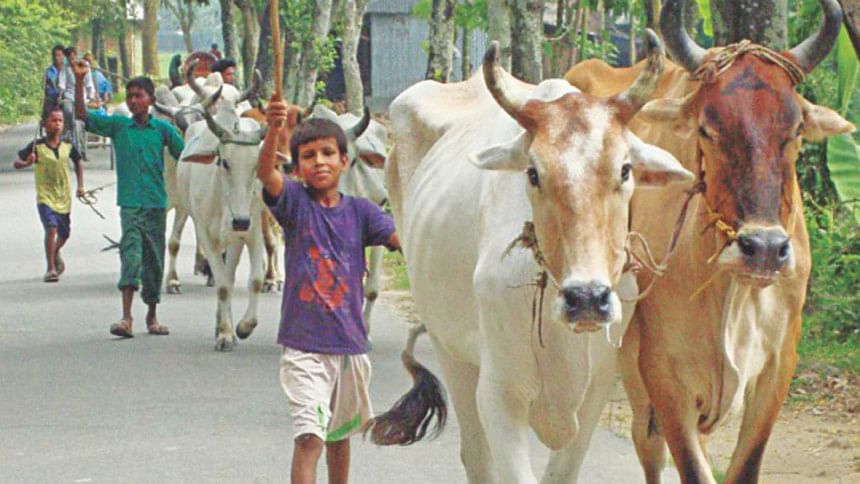Cattle influx from India resumes as Eid-ul-Azha gets close

The cattle influx from India has resumed along the border in Kurigram ahead of Eid-ul-Azha after months of fall in its supply since April this year.
Though the tightening of the monitoring by Border Security Force of India along the border led to the sharp surge in beef prices in Bangladesh, it had raised hopes among local cattle farmers that they would get better prices for their cattle during the Eid sale this time.
But their high hopes have started fading away as UNB Kurigram correspondent reports huge import of Indian cows and buffaloes along the border over the last few days.
Kurigram Customs Inspector Ashraful Islam told UNB that 35,147 Indian cattle have passed the corridors at Dharla Bridge point and Roumari point in the district this month. When a consignment of illegally imported Indian cattle is seized by the members of Border Guard Bangladesh (BGB), the customs department 'corridors' allegedly take Tk 500 each to clear the way for the traders to take those to local markets.
The cattle inflow has increased greatly over the last few days, according to a press release issued from the office of Kurigram BGB battalion-45 commanding officer Lt Col Zakir Hossain.
Zahurul Islam, a cattle trader of the district, told UNB that the price of per maund of beef here rose to Tk 13,000-14,000 from Tk 11,000 recently following the recess in the inflow in Indian cattle.
But the beef price has not increased as it is expected ahead of the Eid because the Indian cattle have started flooding the local markets, he noted.
Officials at the Directorate General of the Department of Livestock Service (DLS) also came up with assurances that the country's cattle stock is about to get as big as two crore very soon and that it was fair enough to meet the demand ahead of the Eid-ul-Azha.
The tightening of cattle influx from India could have been considered as a blessing in disguise as it had created an opportunity for Bangladesh to revamp the domestic livestock market as local farmers had already started giving more concentration on domestic production, they added.
Despite a sharp fall in the cattle influx from India due to their tight border monitoring, Bangladesh has already got a stock of 30 lakh cows and buffalos and 69 lakh goats, and the number may hit 1.9 crore ahead of the Eid-ul-Azha.
Director General of the Department of Livestock Services (DLS) Ajay Kumar Roy came up with the figure quoting their union-level reports amid concern that the upcoming the Eid-ul-Azha may see an overheated market of sacrificial animals. "Some 10-15 percent will be added to the existing figure for cows and buffalos because the counting is still on," Roy told UNB.
He, however, sees a blessing in disguise in the fall in cattle influx as it has created an opportunity for Bangladesh to revamp the domestic livestock market as local farmers have already started giving more concentration on domestic production.
"Definitely, it's an opportunity for us. Domestic production [of cattle] is gradually increasing," Roy insisted.
Though the overall situation has led to a sharp meat price hike in the domestic market, Bangladesh will be benefited in the long run as cattle farmers are now encouraged to go for a large scale cattle farming, he said.
Meanwhile, the flow of sacrificial animals from Myanmar through Bangladesh-Myanmar border has increased sharply in recent days.
The DG, however, could not make any comment on whether the cows are coming through formal or informal channels.
IMPORT FROM MYANMAR
UNB's Cox's Bazar correspondent Tofail Ahmed says they have seen an increased number of cattle from Myanmar through Teknaf border.
The cows are being imported through formal channel using only corridor in Teknaf that increased income for the customs authority.

 For all latest news, follow The Daily Star's Google News channel.
For all latest news, follow The Daily Star's Google News channel. 



Comments